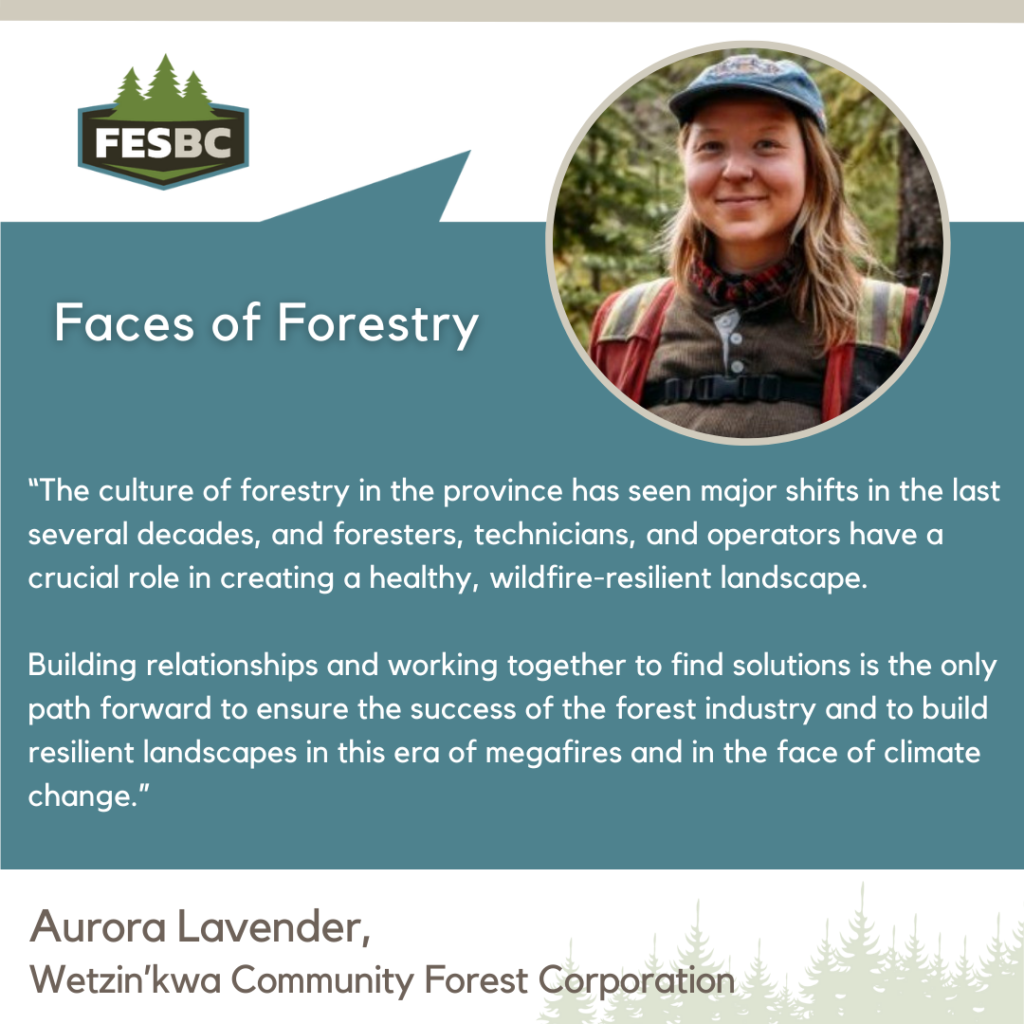Faces of Forestry is an initiative of the Forest Enhancement Society of BC (FESBC) to highlight people doing great work to enhance our forests throughout British Columbia. This month, we feature Aurora Lavender, representative of the Wetzin’kwa Community Forest Corporation (WCFC) on the BC Community Forest Association’s (BCCFA) Board of Directors.
Auroraholds a Bachelor of Arts, with a major in Environmental Studies, from the University of Toronto, as well as a Masters in Forest Conservation.
“I was interested in a career in forestry because I spent a lot of time outdoors and have a strong affinity for nature, especially when it comes to wildlife and the maintenance of biodiversity values, as well as First Nations involvement in land use planning and decision-making,” she explained. “I always wanted to be involved in the natural resource sector because I believe that the strongest changes can come from within existing systems and that there need to be passionate individuals who are able to balance all values in these impactful roles.”
After a summer working on urban forestry with BioForest Technologies Inc. and finishing up her capstone project on gypsy moth and urban pest/forest health programs, Aurora made the decision to move to British Columbia to further develop her knowledge and skills in operational forestry.
Upon her arrival, she began working at Silvicon Services Inc. and quickly became a project manager in their timber development department. At Silvicon, Aurora worked closely with clients to ensure that safety and sustainability were at the forefront of block planning and development.
During her time at Silvicon, Aurora also began working as the General Manager for WCFC, taking direction from their Board of Directors and collaborating with diverse interest groups, First Nations, and the local community to manage a successful community forest tenure while simultaneously providing benefits such as wildfire risk reduction.
Today, Aurora continues to diligently represent WCFC on the BCCFA’s Board of Directors, enjoying the amount of engagement with interest groups and natural resource sector experts she gets to work with every day to make tangible changes in forestry management.
“The public has a strong affinity for their forests and everyone who spends time outdoors deserves a voice on what happens with their local forests, which is why the community forest model is so sustainable,” she explained. “Community forests support local people making decisions about their forests and most of them are formed through partnerships with First Nations. These are prime examples of where long-term planning and innovative practices can take place and help to build resilient ecosystems, as well as supporting informed public participation in community forest decision-making and meaningful representation in forest initiatives.”
Aurora’s dedication to community engagement and sustainable forestry practices is further exemplified by her active involvement in wildfire risk reduction initiatives. Collaborating with FESBC, she played a pivotal role in implementing several wildfire risk reduction prescriptions on Hudson Bay Mountain Road, creating a shaded fuel break to mitigate the threat of wildfires to the community and provide a defensible location for wildfire crews during emergencies.
In 2018, FESBC provided funding for the development of a Strategic Wildfire Hazard Mitigation Plan and later, for treatment implementation of this project in 2023.
“FESBC has always been a pleasure to work with, providing great resources and expertise to ensure that project completion was able to succeed. Their funding is critical to reducing wildfire risk province-wide,” she mentioned. “Support from FESBC helps make wildfire risk reduction programs economically feasible for community forests, which in turn helps better protect communities from the threat of wildfires.”
This project was also made possible through several community partnerships with the BC Wildfire Service, Hudson Bay Mountain Resort, the Skeena Stikine Natural Resource District, the Office of Wet’suwet’en, the Gitdumden Clan, Mountain Resorts Branch, Pricewaterhouse Coopers, local contractors, and local resource user groups.
Aurora strongly believes that forest policy and stewardship of British Columbia’s forests have come a long way and are on the right path, with a lot of passionate individuals who are striving to create an economically and environmentally sustainable future for the forest industry.
“The culture of forestry in the province has seen major shifts in the last several decades, and foresters, technicians, and operators have a crucial role in creating a healthy, wildfire-resilient landscape.”
Additionally, Aurora emphasizes the importance of public engagement and collaboration in forestry decision-making, urging both the public and forestry entities to foster open dialogue.
“Building relationships and working together to find solutions is the only path forward to ensure the success of the forest industry and to build resilient landscapes in this era of megafires and in the face of climate change,” she said.
Thank you, Aurora, for your passion and tireless efforts in sustainable resource management and wildfire risk reduction. Your dedication to community education, incorporation of First Nations perspectives and knowledge, and biodiversity and interest group values enrich all levels of planning processes, leaving a lasting impact on forestry in British Columbia.

